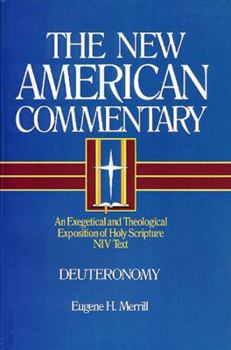Deuteronomy (New American Commentary)
(Book #4 in the New American Bible Commentary, Old Testament Set Series)
THE NEW AMERICAN COMMENTARY is for the minister or Bible student who wants to understand and expound the Scriptures. Notable features include: * commentary based on THE NEW INTERNATIONAL VERSION;* the NIV text printed in the body of the commentary;* sound scholarly methodology that reflects capable research in the original languages;* interpretation that emphasizes the theological unity of each book and of Scripture as a whole;* readable and applicable exposition.
Format:Hardcover
Language:English
ISBN:0805401040
ISBN13:9780805401042
Release Date:June 1994
Publisher:Holman Reference
Length:480 Pages
Weight:1.75 lbs.
Dimensions:1.3" x 6.4" x 9.3"
Customer Reviews
3 ratings
A Great Work By A Great Scholar
Published by Thriftbooks.com User , 16 years ago
This is a great work by one of evangelicalism's greatest experts on the topic. From a solidly conservative perspective, the author expounds this foundational book of Moses in a highly knowledgeable manner, being well-informed by scholarship from all sources.
Strong on Unity Weak on Theology
Published by Thriftbooks.com User , 19 years ago
I compared this commentary to Thompson (TOTC) and Craigie (NICOT). Merrill helps you see the rationale for the structure of Deuteronomy. He is much better at it than Craigie and especially better than Thompson. Merrill really helps you see the unity in Chapters 12-26, the section of the book that seems full of unrelated parts. Merrill disappoints however in His lack of theological depth. There are places in Deuteronomy where the theology is as deep as a river, and Merrill will only wade to his ankles. Take for example Deuteronomy 8:3 "Man doth not live by bread only, but by every word that proceedeth out of the mouth of God." Merrill's comments: God allowed "them to hunger and then to be fed by the miraculous supply of manna . . . an act so clearly supernatural that the poeple had to recongnize that it was all God and not of themselves. . . . There are relative values in life, and one of them is that spiritual food is more important than physical." Compare to Craigie's masterful comments: "The severity of the wilderness period undermined the shallow bases of confidence of those who were not truly rooted and grounded in God. The wilderness makes or breaks a man; it provides strength . . . not the strength of self-sufficiency, but the strength that comes from a knowledge of the living God. When the people were hungry, God fed them manna . . . designed to teach the Israelites a fundamental principle of their existence. . . The basic source of life was God and the words of God to his people; every utterance of the mouth of the Lord was more basic to Israelite existence than was food." Merrill waded, but Craigie plunged in. There are other places in which this weakness of Merrill's is evident. Compare Merrill with Thompson on 10:14-15. Merrill states the facts of the verse like a car maintenance manual. Thompson has marveled at the significance of God's self-existence and written a page of profound theological meditation (it's on page 148 of his commentary). Merrill may have some places in his commentary where he is more theologically reflective, but from what I've seen so far, it is not his strength. In short, Merrill can make sense of the structure of Deuteronomy, but Craigie and Thompson are invaluable for their depth of theological reflection. Own all three.
Upholds Mosaic authorship of Deuteronomy
Published by Thriftbooks.com User , 20 years ago
This is a very good conservative commentary on Deuteronomy. Merrill's introduction includes a spirited defense of the traditional 1447/1446 B.C. date for the Exodus and the Mosaic authorship of the Pentateuch. Some other noteworthy features include: (1) Development of the idea that the Decalogue provides the overall organizing principle for the arrangement of the detailed covenant stipulations of Deut. 12-26; (2) Detailed discussion of Deuteronomy as a "covenant renewal" document structured along the lines of Hittite suzerain-vassal treaties of the second millennium B.C.; (3) Footnotes on virtually every page point the reader to the scholarly literature on Deuteronomy up to 1994.






